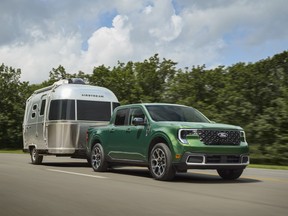Lifestyle
Pickup Trucks Evolve: A Look at 2025’s Top Models

The pickup truck has transformed significantly over the years, evolving from a tool primarily for blue-collar workers to a versatile vehicle favored by diverse drivers. In 2025, pickups serve roles beyond traditional work, appealing to families, outdoor enthusiasts, and urban dwellers alike. This article explores several noteworthy models that illustrate this evolution.
Ford’s Dominance and Innovation
Ford has long been synonymous with pickup trucks, having established its legacy over a century ago with the Model T. Today, the Ford F-150 continues to be Canada’s best-selling vehicle, maintaining this title for the past 15 years. In recent years, Ford introduced the Maverick, a four-door compact truck that has captured attention for its practicality and efficiency. Launched in 2022, the Maverick offers a choice of turbo or hybrid engines, with the hybrid variant, featuring a 2.5-litre engine, outselling its turbo counterpart despite being $2,000 pricier.
The appeal of the Maverick lies not only in its fuel economy—averaging 6.2 L/100 km—but also in its user-friendly design. With room for five passengers and car-like handling, it combines utility with comfort, making it an attractive option for a wide range of consumers. The base price starts at $35,114.
Hyundai and Ram’s Competitive Entries
Hyundai made its entry into the North American pickup market with the Santa Cruz, which debuted three years ago. This compact model stands out with its unconventional styling, resembling a surf wagon more than a traditional work vehicle. The 2025 Santa Cruz features a new exterior design and is powered by a 2.5-litre turbo engine that delivers 281 horsepower and 311 lbs.-ft of torque. With a focus on outdoor adventure rather than heavy-duty tasks, the Santa Cruz is ideal for those seeking a stylish yet functional vehicle.
For 2025, Hyundai has updated the Santa Cruz with modern technology, including a curved panoramic screen with two 12.3-inch displays and enhanced safety features. The fuel economy stands at 10.7 L/100 km, with a base price of $44,794.
The Ram 1500 remains a key player in the pickup segment, offering a wide range of options with over a dozen different models. Prices range from $56,462 for the base Tradesman to $110,399 for the top-tier RHO. Known for its durability and advanced technology, the Ram 1500 includes features such as an active-level four-corner air suspension and an electronic full-time 4WD transfer case.
Luxury is also a focus for Ram, with high-end trims featuring premium leather seating, a stunning 14.4-inch infotainment touchscreen, and a dual-pane panoramic sunroof. The fuel economy for the Ram 1500 is rated at 11.2 L/100 km.
Chevrolet’s Electric Future
The rise of electric vehicles has not left the pickup segment untouched. The Chevrolet Silverado EV represents a significant advancement in this area, offering an impressive full-charge range of up to 720 km. This vehicle maintains a conventional pickup appearance, distinguishing itself only through its EV badging and a unique front trunk capable of accommodating three suitcases.
Chevrolet offers a variety of models within the Silverado EV lineup, starting with the Work Truck Standard at $67,633 and going up to the RST Max Range at $121,333. With a fuel economy rating of 0.5 L/100 km, it reflects a growing trend toward sustainability in the automotive industry.
The pickup truck market in 2025 is characterized by diversity and innovation, appealing to a broad spectrum of consumers. As these vehicles continue to evolve, they remain essential for both personal and professional use, proving that their utility and versatility transcend traditional boundaries.
Andrew McCredie, Driving Editor at The Vancouver Sun and The Province, provides insights into these developments and the impacts they have on consumers today.
-

 Education3 months ago
Education3 months agoBrandon University’s Failed $5 Million Project Sparks Oversight Review
-

 Science4 months ago
Science4 months agoMicrosoft Confirms U.S. Law Overrules Canadian Data Sovereignty
-

 Lifestyle3 months ago
Lifestyle3 months agoWinnipeg Celebrates Culinary Creativity During Le Burger Week 2025
-

 Health4 months ago
Health4 months agoMontreal’s Groupe Marcelle Leads Canadian Cosmetic Industry Growth
-

 Technology3 months ago
Technology3 months agoDragon Ball: Sparking! Zero Launching on Switch and Switch 2 This November
-

 Science4 months ago
Science4 months agoTech Innovator Amandipp Singh Transforms Hiring for Disabled
-

 Education3 months ago
Education3 months agoRed River College Launches New Programs to Address Industry Needs
-

 Technology4 months ago
Technology4 months agoGoogle Pixel 10 Pro Fold Specs Unveiled Ahead of Launch
-

 Business3 months ago
Business3 months agoRocket Lab Reports Strong Q2 2025 Revenue Growth and Future Plans
-

 Technology2 months ago
Technology2 months agoDiscord Faces Serious Security Breach Affecting Millions
-

 Education3 months ago
Education3 months agoAlberta Teachers’ Strike: Potential Impacts on Students and Families
-

 Science3 months ago
Science3 months agoChina’s Wukong Spacesuit Sets New Standard for AI in Space
-

 Education3 months ago
Education3 months agoNew SĆIȺNEW̱ SṮEȽIṮḴEȽ Elementary Opens in Langford for 2025/2026 Year
-

 Business4 months ago
Business4 months agoNew Estimates Reveal ChatGPT-5 Energy Use Could Soar
-

 Technology4 months ago
Technology4 months agoWorld of Warcraft Players Buzz Over 19-Quest Bee Challenge
-

 Business3 months ago
Business3 months agoDawson City Residents Rally Around Buy Canadian Movement
-

 Technology2 months ago
Technology2 months agoHuawei MatePad 12X Redefines Tablet Experience for Professionals
-

 Business3 months ago
Business3 months agoBNA Brewing to Open New Bowling Alley in Downtown Penticton
-

 Technology4 months ago
Technology4 months agoFuture Entertainment Launches DDoD with Gameplay Trailer Showcase
-

 Technology4 months ago
Technology4 months agoGlobal Launch of Ragnarok M: Classic Set for September 3, 2025
-

 Technology4 months ago
Technology4 months agoInnovative 140W GaN Travel Adapter Combines Power and Convenience
-

 Science4 months ago
Science4 months agoXi Labs Innovates with New AI Operating System Set for 2025 Launch
-

 Top Stories2 months ago
Top Stories2 months agoBlue Jays Shift José Berríos to Bullpen Ahead of Playoffs
-

 Technology4 months ago
Technology4 months agoNew IDR01 Smart Ring Offers Advanced Sports Tracking for $169










